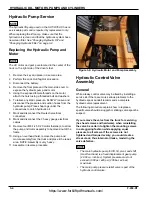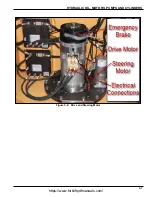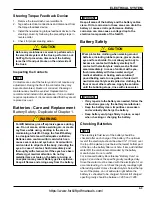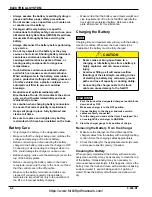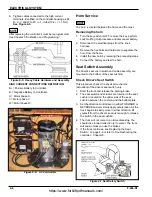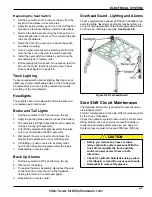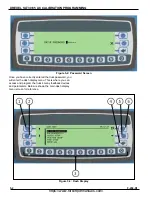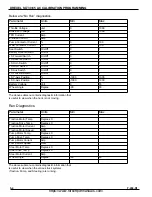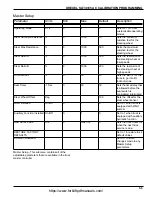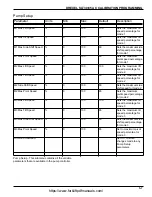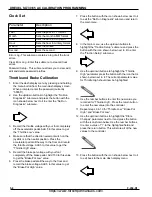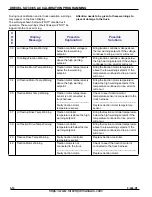
4-4
F-459-R1
ELECTRICAL SYSTEM
• Always assume the battery is emitting hydrogen
gases and follow proper safety precautions.
• Do not smoke, use an open flame, or create arcs
or sparks near the battery.
• Packaged with every battery are specific
instructions for battery safety, care and use, plus
a Material Safety Data Sheet (MSDS). Read these
documents thoroughly before servicing the
battery.
• Always disconnect the battery before performing
any service.
• Do not lay objects on the battery as they may
cause a short circuit. Shorting battery terminals
can release enormous amounts of energy,
causing electrical shock, sparks or flame, or
heating nearby components to dangerous
temperatures.
• Truck batteries contain concentrated sulfuric
acid which can cause severe chemical burns.
When adding water to the battery, wear rubber
gloves, protective clothing and safety glasses or
a full-face shield. Use a plastic container or an
automatic cell filler to prevent container
breakage.
• Neutralize acid spills immediately with
Bicarbonate of Soda. If acid contacts the skin or
eyes, wash with water immediately and seek
medical help at once.
• Use caution when changing battery connectors
to ensure that correct polarity is maintained.
• Keep vent plugs in place, fully tightened and
clean at all times.
• Be sure to replace and retighten any battery
restraints which have been installed on the truck.
Battery Care
• Only charge the battery in the designated area.
• Make sure that the charger being used matches the
voltage and amperage of the truck battery.
• Before connecting and disconnecting the battery
charger to the battery, make sure the charger is OFF.
Connecting or disconnecting the charger when it is
ON, could damage the charger or cause an arc.
• Before charging, make sure the electrolyte covers the
top of the battery plates.
• Before connecting the battery cable to the truck’s
receptacle, make sure the key to the truck is off and
that the controls are in the off position.
• Make sure the battery terminals and cables are
cleaned of corrosion regularly. Clean battery
terminals are important not only to the operation of
the lift, but for proper battery charging.
• Make certain that the battery used meets weight and
size requirements of the truck. NEVER operate the
truck with an undersized battery. Reference data
plate information for this information.
Charging the Battery
NOTE
Charging time and requirements will vary with the battery
size and condition. Whenever the truck needs to be
troubleshot, the battery must be fully charged.
CAUTION
IMPORTANT
1.
Park the truck at the designated charge area with forks
down and key OFF.
2.
Make sure charger is in the OFF position.
3.
Connect battery to the charger and make certain
cables are firmly connected.
4.
Turn the charger on and set the timer, if equipped. For
an overnight fill, set charger to NORMAL.
5.
View the charger gauge to be positive of charge
.
Removing the Battery From the Charger
1.
Make sure the charger is off and disconnect the
charger cables from the battery with a straight pulling
motion. Store the charging cables appropriately.
2.
Check the battery for the appropriate electrolyte level
and measure specific gravity, if needed.
Cleaning the Battery
When properly maintained, the battery will remain rela-
tively clean and dry. It may be necessary to clean the top
of the battery. Occasionally it may be necessary to
remove excessive electrolyte. If this happens, remove the
battery from the truck and clean with a solution of baking
soda and water (1 pound baking soda to 1 gallon of
water). Rinse the battery off with water and allow to air
dry.
• Never smoke or bring open flame to a
charging or idle battery. Gas from a battery is
highly explosive and can cause serious
injury.
• Avoid over filling as it will cause overflow
(flooding) of the electrolyte, resulting in loss
of electrolyte, battery tray corrosion, ground
paths and loss of capacity or working ability.
• Connecting the charger cable to the truck
cable can cause damage to the forklift
https://www.forkliftpdfmanuals.com/







